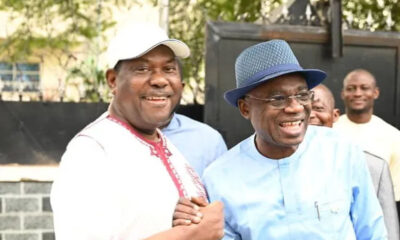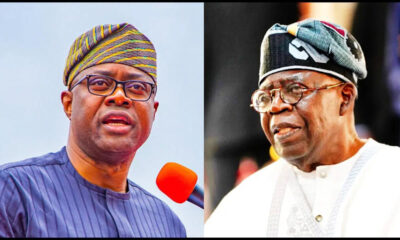News
Student Loan Bill: Tinubu passionate about education, says minister
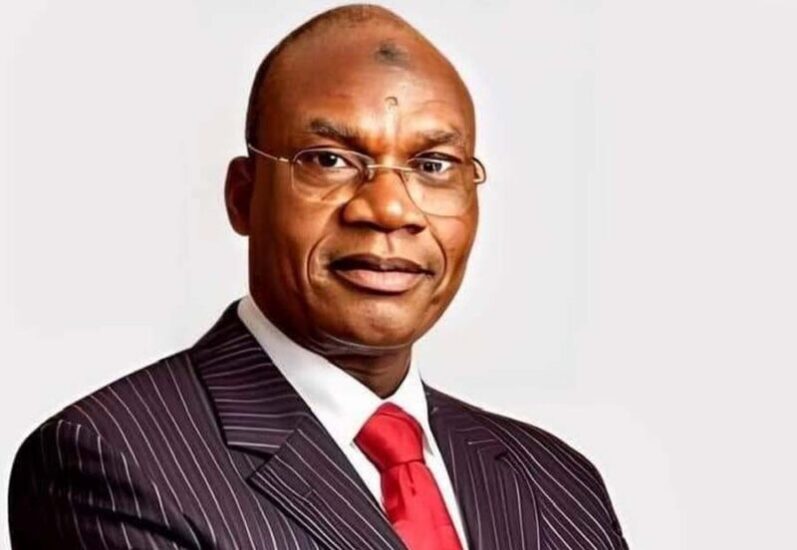
Student Loan Bill: Tinubu passionate about education, says minister
The Minister of Education, Prof. Tahir Mamman, on Monday, March 18, said President Bola Tinubu does not want any child of school age to be out of school, because of his passion for the education sector.
This is even as Senate president Godswill Akpabio said that the legislative agenda of the 10th National Assembly will bring about tremendous improvement in the standard of living of Nigerians.
Tahir and Akpabio spoke in Abuja during a Public Hearing organised by the Senate Committee on Tertiary Institutions and Tetfund and House of Representatives Committee on Students Loan, Scholarship and Higher Education Financing on Student Loan (Access to Higher Education), repeal and reenactment Bill 2024, at the Senate, on Monday.
The Minister of Education, Prof. Mamman, commended President Tinubu for his passion and commitment to the education sector.
He said the president does not want any child of school age to be out of school, given his passion for the sector.
He said the public hearing would provide an opportunity to make further input to improve the bill for the good of Nigerian students.
Represented by the Deputy President of the Senate, Senator Barau Jibrin, he commended President Bola Ahmed Tinubu for his foresight and uncommon passion in supporting the students of the country with the loan scheme.
He said the scheme will address the problems of lack of funding among Nigerian students.
“The present 10th National Assembly at its inception in 2023 set out for itself a legislative agenda whose implementation will surely bring about a tremendous improvement in the living conditions/standards of the citizenry with Mr. President’s Renewed Hope Agenda,” Akpabio said.
In amending the bill, Akpabio said the opinions of all stakeholders would be considered to have the best legislation.
READ ALSO:
- FRSC officials can operate on all roads in Abuja – Appeal court
- BREAKING: Voice, data services affected by undersea cable cuts restored – NCC
- JUST IN: 4 feared killed as Arewa youths clash with police, union in Delta
“I wish to urge you to freely express your views and opinions either for or against the subject of this hearing in a manner that will bring about the sustenance of our collective will to be together as a nation to call ours.
“Public Hearings are one of the primary legislative processes that offer the general public and especially relevant stakeholders the opportunity to contribute their quota to law-making.
“There is no doubt that your views at this Joint Public Hearing will go a long way in assisting the committee make an informed recommendation (s) to the Senate and the House of Representatives respectively.
“It is this submission/recommendation of the Committees that the Senate and the House of Representatives will rely on to pass/make relevant laws for the good governance of our citizenry as enshrined in the 1999 Constitution of the Federal Republic of Nigeria as amended,” he said.
The Chairman of the Senate Committee on Tertiary Institutions and TETFund, Senator Muntari Dandutse, said access to quality higher education was a pressing concern for many Nigerian students.
He said the student loan scheme offers hope for addressing issues of students and ultimately improving Nigeria’s tertiary education.
He said the scheme would promote access to education and enable more students to pursue their dreams.
Dandutse said the successful implementation of the scheme would unlock a brighter future for the youths and the entire nation.
He stated: “By removing financial barriers, these initiatives will enable more students to pursue higher studies, leading to a larger pool of skilled graduates who contribute to the country’s social and economic development. Increased literacy rates foster economic growth, social progress, and democratic participation.”
He urged all stakeholders to make valuable inputs to effect positive change in the act and drive progress in the nation’s tertiary education sector.
Also on Monday, the National Association of Nigerian Students (NANS), called for the provision of study grants for Nigerian students in the Bill seeking to establish the Nigeria Education Loan Fund (Nelfund).
President of NANS, Mr. Lucky Emonele, in his presentation at the public hearing on the 2024 Students Loans Access to Higher Education Bill 2024, commended President Tinubu for responding to the request of NANS, by including its leadership as representatives of the students on the loan board.
READ ALSO:
- Court dismisses Nnamdi Kanu’s appeal against police, DSS over unlawful arrest, detention
- Withheld Salaries: UNN SSANU, NASU join nationwide warning strike
- Ramadan: Dangote feeds thousands, distributes million bags of rice across Nigeria
He also commended the decision to repeal the act to address grey areas that could hinder the success of the student loan scheme.
According to him, there is a need to make provision of grants for students, to enable them to complete or further their studies.
This, he said would encourage more students to enroll in school and alleviate the burden that the loans may place on beneficiaries.
“If the Federal Government through the Tertiary Education Trust Fund (TETFund) could earmark N683 billion on public tertiary institutions in 2024, without requesting for payback from beneficiary institutions, Nigerian students should not be treated any different,” he said.
He said the proposed repayment period of two years post-National Youth Service Corp (NYSC) for the loan was not realistic, saying that less than 10 per cent of Nigerian graduates get absorbed into the labour force upon completion of their NYSC.
The NANS President, therefore proposed for a minimum of five years repayment duration, given the challenges of unemployment after graduation.
He also appealed that the provision of a loan scheme should not be a further reason to arbitrarily increase school fees by the management of tertiary institutions.
He urged the National Assembly to pass a resolution that prohibits public tertiary institutions from increasing school fees in the next 10 years.
This, he said was the only way to sustain the act when enacted.
Some of the stakeholders at the public hearing included officials of the Central Bank of Nigeria (CBN), Ministry of Education, Federal Ministry of Youth Development, Federal Inland Revenue Services (FIRS), and Joint Admissions and Matriculation Board (JAMB) among others.
Student Loan Bill: Tinubu passionate about education, says minister
News
Tinubu Rejects Calls to Suspend New Tax Laws, Insists Reforms Will Proceed

Tinubu Rejects Calls to Suspend New Tax Laws, Insists Reforms Will Proceed
President Bola Tinubu has rejected calls to suspend the implementation of Nigeria’s new tax laws, insisting that no substantial issue has been established to justify halting the reform process.
In a statement personally signed on Tuesday, Tinubu affirmed that the tax reform laws, including those that took effect on June 26, 2025, and others scheduled to commence on January 1, 2026, will be implemented as planned.
“No substantial issue has been established that warrants a disruption of the reform process,” Tinubu said. “Absolute trust is built over time through making the right decisions, not through premature, reactive measures.”
The president’s position comes amid growing public debate over alleged discrepancies between the tax acts passed by the National Assembly and versions published in the Official Gazette.
On December 26, the National Assembly ordered a re-gazetting of the tax laws after acknowledging differences between the legislative versions and the published documents. In separate statements, the House of Representatives spokesman, Akin Rotimi, and the Clerk to the National Assembly, Kamoru Ogunlana, assured Nigerians that the matter was being addressed within constitutional and statutory limits.
READ ALSO:
- Two Close Aides of Anthony Joshua Identified as Victims of Fatal Crash
- Court Orders Accelerated Hearing of Suit Challenging 2025 Tax Acts, Declines Injunction
- Sophia Momodu Asks Fans to Stop Calling Her Davido’s Wife
They explained that the review was being conducted in line with the 1999 Constitution, the Acts Authentication Act, and established parliamentary practice, stressing that the exercise was purely administrative and did not suggest any defect in legislative authority.
“This administrative action is intended solely to authenticate and formally reflect legislative decisions,” the statements said, adding that certified true copies would be made available to stakeholders and the public.
However, former Vice President Atiku Abubakar described the situation as “a grave constitutional issue,” arguing that any law published in a form not passed by the National Assembly amounts to a nullity.
“A law that was never passed in the form in which it was published is not law,” Atiku said, warning that any post-passage alteration without legislative approval would constitute a constitutional breach.
Despite the controversy, President Tinubu, who is currently on vacation in Europe, reiterated his administration’s commitment to due process and pledged continued collaboration with the National Assembly to resolve any outstanding issues.
“These reforms are a once-in-a-generation opportunity to build a fair, competitive, and robust fiscal foundation for our country,” Tinubu stated, adding that the new laws are aimed at harmonisation, structural reset, and strengthening the social contract, not increasing tax burdens.
The affected legislations include the Nigeria Tax Act 2025, Nigeria Tax Administration Act 2025, Joint Revenue Board of Nigeria (Establishment) Act 2025, and the Nigeria Revenue Service (Establishment) Act 2025.
Tinubu urged stakeholders to support the implementation phase, which he described as firmly in the delivery stage, assuring Nigerians that the reforms are designed to promote prosperity and shared responsibility.
Tinubu Rejects Calls to Suspend New Tax Laws, Insists Reforms Will Proceed
News
NAF Bombards Lakurawa, Bandit Camps in Zamfara after US airstrike

NAF Bombards Lakurawa, Bandit Camps in Zamfara after US airstrike
In a major escalation of counterterrorism operations across the North-West, the Nigerian Air Force (NAF) has carried out devastating precision airstrikes on notorious bandit enclaves in Zamfara State, coming on the heels of United States missile strikes that crippled Lakurawa terrorist camps in Sokoto.
The Air Component of Operation Fansan Yamma, Sector 2, executed two high-impact air interdiction missions at Turba Hill and the camp of feared bandit leader, Kachalla Dogo Sule, both located in Tsafe Local Government Area of Zamfara State. Several bandits were neutralised, while key operational facilities were destroyed.
Director of Public Relations and Information of the NAF, Air Commodore Ehimen Ejodame, described the strikes as a significant breakthrough in the sustained offensive against armed banditry.
He said the operations were intelligence-driven, relying on credible, multi-source intelligence and persistent surveillance. The first strike targeted Turba Hill, identified as a major bandit hideout. According to Ejodame, aerial reconnaissance revealed intense human activity and a zinc-roofed structure serving as the nerve centre of the enclave.
“Following positive identification, the target was engaged with precision. Post-strike assessments confirmed the complete destruction of the structure and the neutralisation of several bandits,” he said.
The second mission struck Kachalla Dogo Sule’s Camp, a notorious stronghold linked to the manufacture and deployment of improvised explosive devices (IEDs). Intelligence reports had connected the camp to recent deadly IED attacks along the Dan Sadau–Magami axis.
“The precision strike triggered intense fires that destroyed multiple active structures, effectively crippling the group’s IED production and operational capacity,” Ejodame added.
He noted that the airstrikes had significantly degraded bandit networks in Zamfara and reaffirmed the NAF’s commitment, in collaboration with other components of Operation Fansan Yamma, to denying criminal elements safe havens and restoring lasting peace across the North-West.
Army Confirms US Missile Strikes on Sokoto Terror Camps
Meanwhile, the Nigerian Army has confirmed that recent United States airstrikes targeted Lakurawa terrorist camps in Tangaza Local Government Area of Sokoto State, delivering a heavy blow to the group’s operational capability.
A senior Army Headquarters source disclosed that the strikes were conducted in coordination with US Africa Command (AFRICOM) following actionable intelligence on terrorist movements along the Kaurau axis. The missile strikes hit camps in the Bauni Forest near Waria and Alkassim villages on December 25.
Follow-up patrols carried out the next day confirmed extensive destruction of terrorist infrastructure. Troops later recovered missile debris in Kajiji town, Tambuwal LGA, Kebbi State, believed to be components of Tomahawk missiles.
Army engineers identified some of the debris as fuel boosters weighing about 300 kilograms, capable of penetrating soft ground up to two metres. The Army assured residents that investigations and recovery operations were ongoing and urged the public to report any suspicious objects.
Eight Killed as Terrorists Attack Kebbi Communities
Despite the military gains, terror struck Kebbi State as gunmen launched coordinated attacks on Kaiwa, Gelawu and Gebbe villages in Shanga Local Government Area, killing at least eight people and injuring several others.
The Kebbi State Police Command confirmed that seven victims died during the attacks, while another later succumbed to injuries in hospital. One injured person is currently receiving treatment.
Police spokesperson, CSP Bashir Usman, said security forces had intensified patrols and surveillance across the affected areas to prevent further attacks, though details of ongoing operations could not be disclosed.
Residents described the assaults as unprecedented and devastating, forcing many villagers to flee their homes in fear.
Troops Kill 80 Terrorists, Rescue 34 Victims Nationwide
In a broader update, the Nigerian Army announced that troops killed over 80 terrorists, rescued 34 kidnapped civilians and arrested several criminal suspects in coordinated operations across multiple states between December 25 and 29.
The operations spanned Borno, Adamawa, Sokoto, Katsina, Niger, Zamfara, Plateau, Delta, Cross River and the Federal Capital Territory.
In Borno State, air and ground offensives neutralised 57 terrorists and disrupted ISWAP/JAS networks, while operations in Niger and Katsina repelled coordinated attacks and recovered stolen livestock.
Troops also rescued kidnapped civilians in Kebbi and Plateau states, arrested illegal miners in the FCT, apprehended armed robbery suspects, and dismantled oil bunkering and piracy syndicates in Delta and Cross River states.
The Army said the successes underscore its resolve to sustain intelligence-driven operations, protect lives and property, and dismantle terrorist and criminal networks across the country.
News
Sokoto Operation: FG Reassures Investors, Says Nigeria’s Economy Remain Stable

Sokoto Operation: FG Reassures Investors, Says Nigeria’s Economy Remain Stable
The Federal Government has reassured investors, financial analysts, and international development partners that Nigeria remains peaceful, stable, and economically resilient despite concerns following a joint security operation in Sokoto carried out on Christmas Day.
The Minister of Finance and Coordinating Minister of the Economy, Wale Edun, gave the assurance in a statement issued on Sunday in Abuja, explaining that the operation—conducted in collaboration with the United States—was a targeted, intelligence-led action aimed solely at terrorist elements threatening national security and economic activities.
“What Nigeria is decisively confronting—alongside trusted international partners—is terrorism,” Edun said, stressing that the context of the operation was essential to understanding its broader economic implications.
He described the Sokoto operation as “precise, intelligence-led, and focused exclusively on terrorist elements that threaten innocent lives, national stability, and economic activity,” adding that the action was designed to strengthen security rather than unsettle financial markets or undermine investor confidence.
“Far from destabilising markets or weakening confidence, such actions strengthen the foundations of peace, protect productive communities, and reinforce the conditions required for sustainable economic growth. Security and economic stability are inseparable; every effort to safeguard Nigerians is, by definition, pro-growth and pro-investment,” the minister said.
READ ALSO:
- Ibadan Explosion: Fayose Releases Documents, Claims Makinde Got ₦50bn from FG
- Italy Arrests Nine Over €7M Hamas Funding Network, Seizes €8M in Assets
- Kennedy Center Sues Musician for $1M Over Trump Name Cancellation
Edun noted that under the leadership of President Bola Ahmed Tinubu, Nigeria has recorded measurable progress in security improvements and economic reforms, reflected in key macroeconomic indicators.
According to him, Nigeria’s GDP grew by 3.98 per cent in Q3 2025, following a strong 4.23 per cent growth in Q2, with expectations of an even stronger performance in Q4 2025. He added that inflation has slowed for the seventh consecutive period and now stands below 15 per cent, attributing the improvement to coordinated fiscal and monetary policies.
The minister said Nigeria’s financial markets remain stable, with both domestic and international debt markets functioning efficiently under prudent fiscal management. He recalled that the country recently secured credit rating upgrades from Moody’s, Fitch, and Standard & Poor’s, describing them as independent validation of the government’s reform agenda.
“We have maintained fiscal discipline, prioritised efficiency, and protected macroeconomic stability, demonstrating resilience in the face of external shocks,” Edun said.
Referring to President Tinubu’s recent national address, Edun stated that the administration’s focus for 2026 is to consolidate gains made in 2025, strengthen economic resilience, and sustain momentum toward inclusive and durable growth.
Assuring local and foreign investors ahead of market reopening on Monday, December 29, 2025, Edun said confidence in Nigeria’s economic direction remains justified.
“As markets reopen, investors can be confident that Nigeria remains reform-driven, stable, and focused on growth. The fundamentals are strengthening, the policy direction is clear, and this administration’s resolve to protect lives and secure prosperity is unwavering,” he said.
He concluded by reaffirming the country’s investment outlook: “Nigeria remains open for business, anchored in peace, and firmly focused on the future.”
Sokoto Operation: FG Reassures Investors, Says Nigeria’s Economy Remain Stable
-
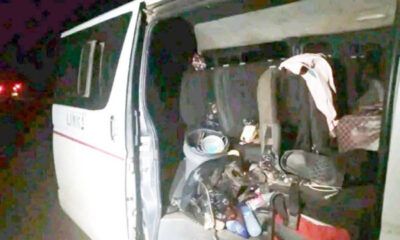
 metro3 days ago
metro3 days agoPlateau Kidnappers Demand ₦1.5m Each as 28 Muslim Travellers Remain in Captivity
-

 metro2 days ago
metro2 days agoNiger Delta Crackdown: Army Seizes ₦150m Stolen Oil, Arrests 19 Suspects
-

 Sports2 days ago
Sports2 days agoCristiano Ronaldo Wins Best Middle East Player at 2025 Globe Soccer Awards in Dubai
-

 Sports2 days ago
Sports2 days agoAnthony Joshua injured as two die in fatal Lagos-Ibadan Expressway crash (plus photos)
-
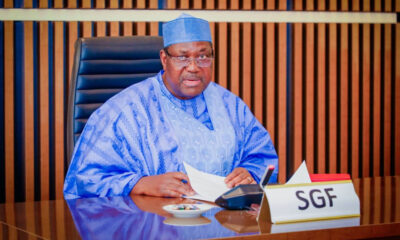
 metro1 day ago
metro1 day agoMrs. Regina Akume Urges SGF George Akume to Return to Christianity Amid New Marriage
-

 metro3 days ago
metro3 days agoBello Turji Not Killed in US Airstrikes, Security Expert Debunks Reports
-

 metro1 day ago
metro1 day agoTwo Close Aides of Anthony Joshua Identified as Victims of Fatal Crash
-

 metro1 day ago
metro1 day agoOgun Man Arrested After ₦4,000 Debt Dispute Claims Stepbrother’s Life









